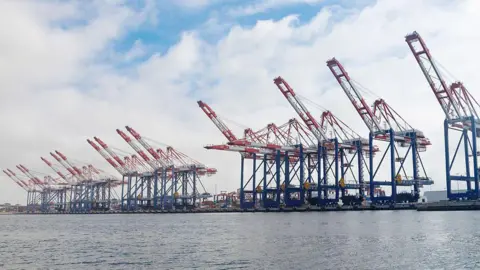 Getty Images
Getty ImagesWhen President Donald Trump dramatically raised tariffs on goods from China last month, New York City retailer Morris Dweck had to respond quickly, cancelling or putting on hold 140 containers worth of items destined for the winter holiday season in six months’ time.
That left his suppliers in the lurch and stranded thousands of artificial Christmas trees.
On Monday, just hours after Trump walked back some of his most aggressive plans, Mr Dweck was back in touch with his suppliers, and moving ahead with shipments.
Like other business owners, he feels a surge of relief, after the US and China announced on Monday that they would be undoing most of the tariffs announced in recent weeks, pulling back from a clash that had sent trade between the two countries plunging and raised fears of significant economic damage.
The US said it would cut back the new duties from a punishing 145% to 30%.
China likewise agreed to lower its retaliatory tariffs on US products to 10%, and committed to unspecified changes to other trade barriers.
The changes come just in time for Mr Dweck, who owns DII, a chain of 19 discount stores in the New York area, stocked with many goods made in China. He had rushed in shipments earlier this year, packing his warehouse with enough merchandise to last him until mid-October.
But the shock of the 145% tariffs – a cost too high to be swallowed by his company or passed onto customers – had raised the threat of empty shelves during the critical November and December festive season.
“If you had told us … even 30% three months ago, we would have said it was insane, that’s crazy, we would never survive,” he said. But now it feels like good news.
“It’s a sigh of relief. Even though it’s very dramatic, business can go on.”
 Newsday/Getty
Newsday/GettyBy the end of last week trade between the US and China – America’s third largest supplier of imports last year and a key source of essentials such as car seats and umbrellas – had dropped precipitously.
Planned arrivals at US ports from China were down roughly 60% year-on year, according to Vizion.
Analysts in the US were marking up the odds of recession, as surveys of businesses and consumer confidence sank sharply.
But, following the trade truce, hopes are now rising that the most significant damage might be avoided.
In notes to clients published after the announcement, firms including Oxford Economics and Goldman Sachs said they now saw reduced odds of recession in the US this year.
While the tariffs might still push up prices for Americans to some degree in the months ahead, the US is likely to be spared the dramatic drop in spending and business activity that the shock of 145% tariffs seemed likely to trigger, said Ben May, director of global macro research at Oxford Economics.
Mr Dweck said he was hopeful that his business could manage the 30% tariff.
He has negotiated rebates with many suppliers and plans to cover some of the costs out of his profit margin. He is also expecting to raise prices, though just how high remains to be seen, given continued uncertainty about tariffs and the wider economy.
Though he would normally have his suppliers put prices on the boxes, he is now planning to take on that task himself, once the goods arrive, even though it is less efficient.
The current tariff rate remains high enough that he is scouting for suppliers in other countries, as he considers making orders for next year.
He is also pushing suppliers to ship goods by August, worried that tensions might erupt again.
“Anything can happen between now and then,” he said.
 Bloomberg/Getty
Bloomberg/GettyBusinesses in China also said they remained worried about the future.
Trump said he was still pushing China to “open up” its economy for American firms and warned that tariffs could rise again – although not to 145% – if negotiations between the two countries do not make progress over the next 90 days.
Tat Kei, a Chinese exporter of personal care appliances to the US, whose factory employs 200 people in Shenzhen, said his firm had welcomed the change and started moving some of the goods that had been stuck in its warehouse.
But he said firms had little confidence that the current rules would stick – and feared that tensions would erupt again.
“From the planning and investment perspective that is the big concern.” he said.
“Right now there’s very low confidence that things will actually be stable in the long run.”

